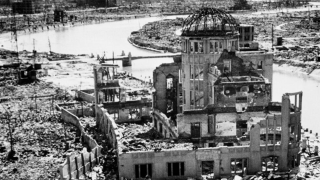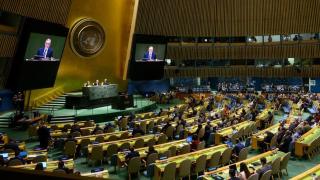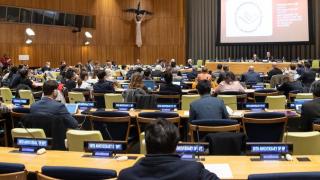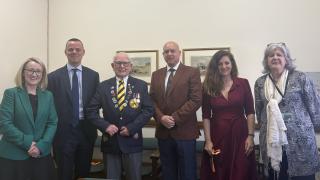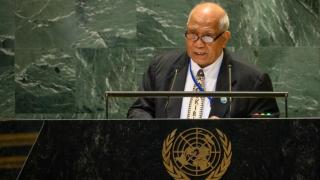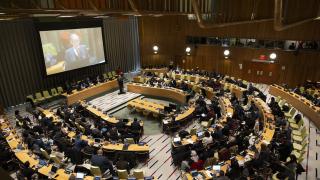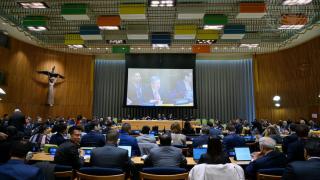
At the Second Meeting of States Parties (2MSP) to the TPNW, the 69 members laid out an ambitious plan to address nuclear risks and challenge the doctrine of nuclear deterrence. They declared: “we cannot stand idly by while signs indicate that humanity is moving closer to global nuclear catastrophe”.
Members highlighted the grave contradiction of nuclear weapons being integrated ever deeper into national security doctrines while those same states espouse the rhetoric of non-proliferation and disarmament. In reality, this approach “dangerously increases the risk of horizontal and vertical nuclear proliferation”, TPNW states say.
Read declaration agreed at 2MSP
Read the action plan agreed at 2MSP
Here are UNA-UK’s top-three takeaways from the meeting:
Nuclear weapons alliances
The topic of nuclear alliances and nuclear weapons hosting was a topic of intense debate throughout the week-long meeting. Western members of the Treaty, including Austria and Ireland, fought to keep the door open for future accession by nuclear-allied democracies whose populations in many cases support nuclear disarmament. The debate was ratcheted up by Russian President Vladimir Putin’s deployment of nuclear weapons to neighboring Belarus in July 2023. As western countries within the TPNW sought to condemn the move, the issue collided with the U.S.’s similar practice of deploying nuclear weapons in Europe.
On nuclear hosting, members eventually settled on the following: “We are disturbed by any placement of nuclear weapons on the territory of non-nuclear-armed States”. The text is seen as a critique of Russia’s move to transfer weapons to Belarus, but also of European states that host U.S. nuclear weapons, two of whom - Germany and Belgium - were in the room as observers. Without Ireland, Austria, and other close allies in the room, the rebuke would likely have been much stronger.
Addressing those states that enter into nuclear security guarantees with nuclear armed states, members of the TPNW urged them to “put an end” to such arrangements and join the Treaty.
Victim assistance and environmental remediation
Throughout the week, first-generation survivors and their descendants were at the centre of proceedings, sharing their testimonies and serving as a reminder to the assembled diplomats and civil society that the TPNW is first and foremost a treaty to address the humanitarian consequences of nuclear weapons.
A joint statement endorsed by 26 nuclear-affected community-led organisations, and supported by a further 45 allied organisations, reads “we have the right and responsibility to speak about what nuclear weapons really do…We call on States Parties to the TPNW to push relentlessly for its universalisation.”
UNA-UK is disappointed that British diplomats chose not to attend, foregoing the opportunity to listen and learn from survivors of nuclear testing including those affected by the UK’s tests in Australia, Kiribati and the USA. We are particularly troubled to learn that the UK is refusing to engage with the programme of work led by state party Kiribati, together with Kazakhstan, on victim assistance, environmental remediation and international cooperation and assistance (Articles 6 and 7 of the Treaty).
The UK detonated nine powerful nuclear weapons in Kiribati and facilitated a further 24 U.S. tests on that territory between 1957 and 1962 while the territory was under British colonial control. The physical and mental health effects and social, economic, and cultural impacts of nuclear testing in Kiribati persist to this day, not only for those directly affected, but for the descendants of those affected by ionising radiation and other aspects of the testing programme, such as enforced displacement of populations and lack of access to lands. The UK has never apologised for the harm caused by the tests in Kiribati or offered compensation.
Ahead of the meeting, UNA-UK coordinated a letter signed by members of the Kiribati community, as well as UK organisations and civil society leaders, imploring the UK to join the meeting as an observer and to engage fully with the work to address the harms associated with their nuclear testing.
The UK was not in attendance at the event, but as the meeting convened, a Government minister in Westminster announced that the UK would not be responding to an official request for assistance from Kiribati. The request, made earlier in 2023, asked the UK for adequate financial compensation and to engage in information exchanges. The UK claims that the island’s clean-up was completed in the early 2000s - a claim that is disputed by the Kiribati government and testing survivors.
Had UK representatives been in attendance, they would have heard Kiribati islander Taraem Taukaro describe some of the ongoing impacts of the UK’s nuclear testing. “Even now on the Island we still can't eat some of the fish as they were poisoned" Tareaem told the Spoiler Alert blog on the sidelines of the event.
To support the remediation and victim assistance work, states at 2MSP plan to establish an international trust fund. While the wording on the trust fund agreed at 2MSP was somewhat vague, belying disagreements between members around exactly who should be able to pay into the fund, most diplomats are quietly confident the fund will be established at the next meeting of states parties, scheduled for March 2025.
A ray of hope in a bleak landscape
The TPNW is currently the only nuclear disarmament treaty growing in support after a year where the architecture governing nuclear weapons looked increasingly embattled. The NPT 5-yearly review meeting failed to agree on an outcome document: the second consecutive unsuccessful review, Russia terminated its membership of the Comprehensive Nuclear-Test-Ban-Treaty, and nuclear armed states are upgrading and expanding their nuclear arsenals. We’ve also seen disturbing and overt nuclear threats, most recently from an Israeli minister in the context of their war on Gaza.
Conversely, the nuclear ban has seen 69 states join since 2017, with several more in the process of ratifying the treaty. ICAN’s Högsta called the TPNW a, “ray of hope in an otherwise bleak landscape.”
We call on the UK to take all avenues to engage with the programme of work led by state party Kiribati on victim assistance, environmental remediation and international cooperation and assistance. This should begin with constructively engaging with the movement to address the harms associated with the UK’s and other states’ nuclear testing ahead of the next Meeting of States Parties in 2025.
Photo: A wide view of the second meeting of States Parties to the Treaty on the Prohibition of Nuclear Weapons. On the screen is Juan Ramón de la Fuente, Permanent Representative of Mexico. Credit: UN Photo/Loey Felipe.

